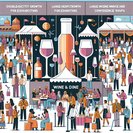
Also on 26 October, HKTB revealed that more than 80 senior meetings-industry buyers from nine short-haul markets—mainland China, India, South Korea, Thailand, Indonesia, Malaysia, Singapore, Vietnam and the Philippines—completed a five-day familiarisation (22–27 October) that piggy-backed on the Wine & Dine Festival. Delegates sampled new incentive products listed in the upgraded ‘Hong Kong Incentive Playbook 2.0’, ranging from fencing masterclasses to cruise-and-conference combos.
Financial Secretary Paul Chan hosted a gala dinner on 25 October recognising top-performing travel agents, while HKTB distributed 3,000 festival passes to international conference participants in town for events such as IATA’s World Sustainability Symposium and iFX EXPO Asia. The initiative is designed to convert business trips into ‘bleisure’ stays and lift per-capita spend.
For corporate mobility professionals, the message is clear: Hong Kong is offering rich add-on experiences—and sometimes financial sweeteners—to win back incentive groups that migrated to Singapore or Bangkok during the pandemic. Travel managers should expect bundled ticket promotions and lane-priority offers at immigration for organised groups.
Trade buyers praised the city’s new cruise itineraries, which allow two-day land programmes before boarding vessels that call at Vietnam, Japan and the Philippines. HKTB hopes this will help hit its target of attracting 1.5 million MICE visitors in 2026, up from an estimated 900,000 this year.
Policy-wise, the success of the fam trip strengthens the case for easing multi-entry visa rules for emerging ASEAN markets—something industry lobbyists say would remove friction for incentive travel.
Financial Secretary Paul Chan hosted a gala dinner on 25 October recognising top-performing travel agents, while HKTB distributed 3,000 festival passes to international conference participants in town for events such as IATA’s World Sustainability Symposium and iFX EXPO Asia. The initiative is designed to convert business trips into ‘bleisure’ stays and lift per-capita spend.
For corporate mobility professionals, the message is clear: Hong Kong is offering rich add-on experiences—and sometimes financial sweeteners—to win back incentive groups that migrated to Singapore or Bangkok during the pandemic. Travel managers should expect bundled ticket promotions and lane-priority offers at immigration for organised groups.
Trade buyers praised the city’s new cruise itineraries, which allow two-day land programmes before boarding vessels that call at Vietnam, Japan and the Philippines. HKTB hopes this will help hit its target of attracting 1.5 million MICE visitors in 2026, up from an estimated 900,000 this year.
Policy-wise, the success of the fam trip strengthens the case for easing multi-entry visa rules for emerging ASEAN markets—something industry lobbyists say would remove friction for incentive travel.





